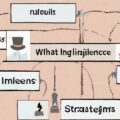Understanding the Intuitive Thinker: Embracing Your Inner Wisdom
In a world that often prioritizes logic and reason, the intuitive thinker stands out as a beacon of inner wisdom and emotional intelligence. These individuals possess a unique ability to tap into their gut feelings, make decisions based on instinct, and navigate life’s complexities with a sense of inner knowing. Far from being irrational or impulsive, intuitive thinkers combine their natural insights with compassion and a deep understanding of human nature.
Let’s explore the beautiful world of intuitive thinking and how it can enhance our wellbeing and relationships.
The Gifts of Intuitive Thinking
Intuitive thinkers possess several remarkable qualities that set them apart:
- Empathy: They have an innate ability to understand and share the feelings of others.
- Creativity: Their minds are often brimming with innovative ideas and unique solutions.
- Emotional intelligence: They excel at recognizing and managing their own emotions and those of others.
- Holistic perspective: Intuitive thinkers see the big picture and how all parts interconnect.
- Adaptability: They’re quick to adjust to new situations and thrive in changing environments.
These gifts allow intuitive thinkers to navigate life with a sense of grace and understanding that enriches both their own lives and the lives of those around them.
Nurturing Your Intuitive Side
While some people are naturally more intuitive than others, we all have the capacity to develop and strengthen our intuitive abilities. Here are some compassionate ways to nurture your inner intuitive thinker:
- Practice mindfulness: Regular meditation and mindfulness exercises can help quiet the noise of everyday life and allow your intuition to speak more clearly.
- Listen to your body: Pay attention to physical sensations and “gut feelings.” Your body often knows things before your conscious mind does.
- Embrace creativity: Engage in creative pursuits like art, music, or writing. These activities can help you tap into your intuitive side.
- Trust yourself: Have faith in your instincts and don’t be afraid to follow your inner guidance, even when it doesn’t seem logical at first.
- Reflect and journal: Take time to reflect on your experiences and write about them. This can help you recognize patterns and insights you might otherwise miss.
The Intuitive Thinker in Relationships
Intuitive thinkers often excel in relationships due to their deep empathy and emotional intelligence. They have a natural ability to understand their partners’ needs and feelings, often before they’re explicitly expressed. This can lead to more harmonious and fulfilling relationships.
However, it’s important for intuitive thinkers to remember that not everyone processes information or emotions the same way. Patience and clear communication are key when interacting with those who may have different thinking styles.
Balancing Intuition with Logic
While intuitive thinking is a powerful tool, it’s most effective when balanced with logical reasoning. The most successful intuitive thinkers know how to combine their instinctual insights with rational analysis. This balance allows for well-rounded decision-making and problem-solving.
Remember, intuition and logic are not opposing forces, but complementary tools that can work together to enhance our understanding and decision-making processes.
The Intuitive Thinker’s Path to Wellbeing
Embracing your intuitive nature can significantly contribute to your overall wellbeing. Here’s how:
- Reduced stress: Trusting your intuition can lead to more confident decision-making and less second-guessing.
- Increased self-awareness: Developing your intuitive abilities often leads to a deeper understanding of yourself.
- Enhanced creativity: Intuitive thinking can unlock new levels of creativity in both personal and professional life.
- Improved relationships: Your heightened empathy and emotional intelligence can lead to stronger, more fulfilling connections with others.
- Greater life satisfaction: Living in alignment with your intuition often results in a sense of purpose and contentment.
By honoring your intuitive side, you’re not just improving your own life, but also contributing to a more compassionate and understanding world.
FAQ: Understanding the Intuitive Thinker
Q1: Can anyone become an intuitive thinker?
A1: Yes, while some people may be naturally more intuitive, everyone has the capacity to develop their intuitive abilities through practice and mindfulness.
Q2: How can I tell if I’m an intuitive thinker?
A2: Intuitive thinkers often have strong empathy, trust their gut feelings, see patterns easily, and prefer to focus on the big picture rather than details.
Q3: Is intuitive thinking always accurate?
A3: While intuition can be a powerful tool, it’s not infallible. It’s best used in conjunction with logical reasoning and factual information.
Q4: How can I improve my intuitive thinking?
A4: Practice mindfulness, pay attention to your feelings and physical sensations, engage in creative activities, and reflect on your experiences through journaling.
Q5: Can intuitive thinking help in professional settings?
A5: Absolutely! Intuitive thinking can be valuable in problem-solving, decision-making, and understanding team dynamics in the workplace.
Embracing your inner intuitive thinker is a journey of self-discovery and growth. It’s about learning to trust yourself, developing a deeper understanding of others, and navigating life with both heart and mind. As you cultivate your intuitive abilities, remember to approach yourself and others with compassion and understanding. The world needs more intuitive thinkers who can bring empathy, creativity, and holistic perspectives to our shared challenges. So trust your instincts, listen to your inner wisdom, and let your intuition guide you towards a more fulfilling and compassionate life.









